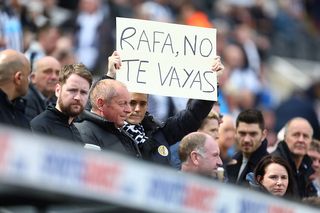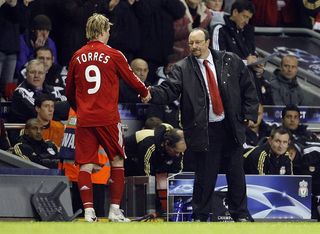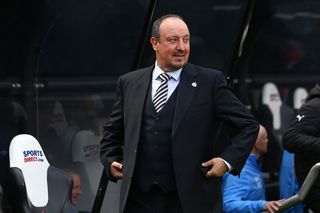Rafa Benitez is one of football's most misunderstood figures – even if he's a walking contradiction
The apparently awkward and aloof tactician has opted to remain at St James' Park despite relegation, a decision that Alex Hess explains underlines his capacity for emotion...

Rafael Benitez stepped in front of the cameras and channelled his inner R Kelly. “My heart is obviously telling me yes, this is a fantastic opportunity. But at the same time you have to use the brain.”
When the famously icy and dispassionate Benitez put his decision in those terms – that his staying at Newcastle United was a straight choice between his head and his heart – few assumed the latter would win out. Plenty were probably surprised it had even entered into the equation.
Those who know him best, though, may be rather less shocked at how he’s been swayed by the affection that's tumbled down on him from the St James’ Park terraces during his short stint on Tyneside. They may even find it tiresomely predictable. Because while Benitez’s public image remains one of almost robotic detachment, the reality of the man is a shade more complex. In fact, as hard-hearted autocrats go, Benitez might just be the most gushingly emotional there’s ever been.

Tearing up
Back in 2011, an ovation from Liverpool fans as he attended the Hillsborough memorial service again had Rafa reaching for the handkerchief
This is, after all, a man who welled up in his departing press conference as Valencia coach as he spoke of “one of the most difficult decisions I’ve ever had to make”, and whose unveiling at boyhood club Real Madrid was marked by his trying – and failing – to fight back the waterworks.
Back in 2011, an ovation from Liverpool fans as he attended the Hillsborough memorial service (his last act of manager a year earlier was to donate £96,000 to the families’ campaign fund) again had Rafa reaching for the handkerchief.
As public outpourings of emotion go, that’s a fairly lengthy list by the standards of any adult male, not least once whose great undoing is supposedly a steadfast refusal to allow the world a glimpse behind his cold and calculating exterior. In fact, when it comes to Benitez there’s one word above all other that’s notable for its frequency.
Get FourFourTwo Newsletter
The best features, fun and footballing quizzes, straight to your inbox every week.
“It’s emotional to finally be home,” were his words upon being appointed at Madrid. Six months later, he spoke of how his impending trip to Valencia’s Mestalla “will be emotional for me”. After April’s fightback at Anfield he described his return to the ground as both “emotional” and “very emotional” in the space of one interview. And he went one better in the wake of Newcastle’s tonking of Tottenham this month, recounting the fans’ non-stop serenading of him as “very, very emotional”.
Football obsessive
Fernando Torres, for instance, recalls proudly informing his manager that his wife was expecting a child, only for the conversation to be quickly redirected towards some essential tweaks to the striker’s near-post runs
Which isn’t to say, of course, that the idea of Benitez the icy technocrat isn’t also entirely true. Like most real-life personalities, he's a man of rather wild contradictions and it requires little digging to unearth an anecdote or three attesting to his more alienating qualities, many of which quickly pass from the startling to the hilarious.
Fernando Torres, for instance, recalls proudly informing his manager that his wife was expecting a child, only for the conversation to be quickly redirected towards some essential tweaks to the striker’s near-post runs; one of Benitez’s first conversations on the Istanbul pitch in the wake of the 2005 penalty shootout was to lecture Djibril Cisse on his misreading of Milan’s offside trap.

“I was a bit taken aback by his attitude. It was like being in the presence of an unsmiling headmaster,” wrote Craig Bellamy. “Cold, almost inhumane,” was the assessment of Jerzy Dudek, who went on to outline his own compulsion to punch Benitez in the face. Certainly, the notion that the Spaniard is perhaps not the most tender or paternal of managers has not sprung from nowhere.
Emotional decision-making
Benitez is already well versed in the idiosyncrasies of the grand old industrial cities of the north, and indeed of English football’s more misty-eyed breed of supporter
Yet Benitez – whose unquenchable thirst for total managerial control has led him to sign for such accommodating, hands-off employers as Roman Abramovich, Florentino Perez and Mike Ashley – is a more layered character than the litany of snippets suggest. He may refuse to let emotions enter the fray when dealing with his players but that’s not to say he isn’t instinctively rocked by the sentimentality that runs through his line of work. Or, even, that he isn’t drawn impulsively to the clubs where such wistfulness is at its very strongest.
Newcastle, as the cliché goes, is a club whose fanbase is more sentimental than most. And while that may be a lazy, hackneyed stereotype, it’s also true: when a once-grand club is starved of present-day success, nostalgia – that most sentimental of feelings – is what fans are left clinging to. Factor in the broader context of a community that Britain’s post-Thatcher economy has snatched away from its industrial roots, and you have nostalgia as a supremely powerful presence on Tyneside.

Benitez is already well versed in the idiosyncrasies of the grand old industrial cities of the north, and indeed of English football’s more misty-eyed breed of supporter – and it’s no coincidence that on Merseyside he made up one half of Liverpool’s most affectionate fan/manager connection since the halcyon days of Dalglish. “Benitez’s bond with Kopites is unbreakable,” wrote James Pearce in the Liverpool Echo last month. “He will always be welcomed back with open arms.”
Whatever doting kinship the Anfield crowd had with Benitez, though, was seemingly not shared by his players. To the voices of Bellamy and Dudek can be added Steven Gerrard. “I don't think Benitez liked me as a person,” he wrote. “At press conferences he might call other players by their first name but I was always 'Gerrard'. It was the same in the dressing room.”
And while it might be argued that Gerrard, despite his inward heartache, played his best football by some distance under Benitez, the same defence can’t be mounted for all instances of the manager’s aloofness.
Heart wins out

Who is Jorge Mendes? The super-agent making football moves happen
Mourinho, by those who know him: what his former colleagues really think
Man United must decide what they are, and where they’re going in the transfer market
His irritation at Xabi Alonso missing an away trip to Inter after his girlfriend went into labour is often cited as the moment the blue touch paper was lit on the midfielder’s destabilising departure. Most recently, Benitez’s unwillingness to perform the ego-inflation rituals necessary to keep the Real Madrid squad onside – including his joyously stubborn refusal, under serial questioning, to label Cristiano Ronaldo the world’s best player – is largely seen to have caused him to lose his dream job.
And yet this man of unmatchable frostiness is the same one who was parading around St James’ Park after the final game of the season, lapping up the approbation and blowing impassioned kisses to all corners of the grand old stadium.
“The love I could feel from the fans was a big influence,” Benitez said on Wednesday, of his decision to strap himself in at St James’ for the long haul, before revisiting a familiar theme.
“Maybe it’s because I’m older that I’m more emotional now,” he said. “But after the last game it would have been very difficult to walk away. It was amazing. I want to repay the fans.”
Benitez, football’s most famously unfeeling character, had thought long and hard – and listened to his heart. As if he could have done anything else.
